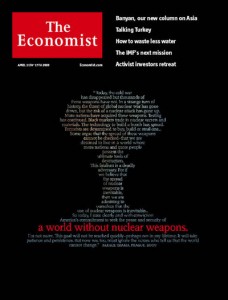This cover of the Economist is fabulous because of this amazing quote. “But now we, too, must ignore the voices who tell us that the world cannot change.” I think that is my new favorite quote…. how true indeed.
“Today, the Cold War has disappeared but thousands of those weapons have not. In a strange turn of history, the threat of global nuclear war has gone down, but the risk of a nuclear attack has gone up. More nations have acquired these weapons. Testing has continued. Black market trade in nuclear secrets and nuclear materials abound. The technology to build a bomb has spread. Terrorists are determined to buy, build or steal one.
[…] Some argue that the spread of these weapons cannot be stopped, cannot be checked — that we are destined to live in a world where more nations and more people possess the ultimate tools of destruction. Such fatalism is a deadly adversary, for if we believe that the spread of nuclear weapons is inevitable, then in some way we are admitting to ourselves that the use of nuclear weapons is inevitable.
[…] So today, I state clearly and with conviction America’s commitment to seek the peace and security of a world without nuclear weapons. I’m not naive. This goal will not be reached quickly – perhaps not in my lifetime. It will take patience and persistence. But now we, too, must ignore the voices who tell us that the world cannot change.”





